新概念英语重点
- 格式:doc
- 大小:32.00 KB
- 文档页数:6
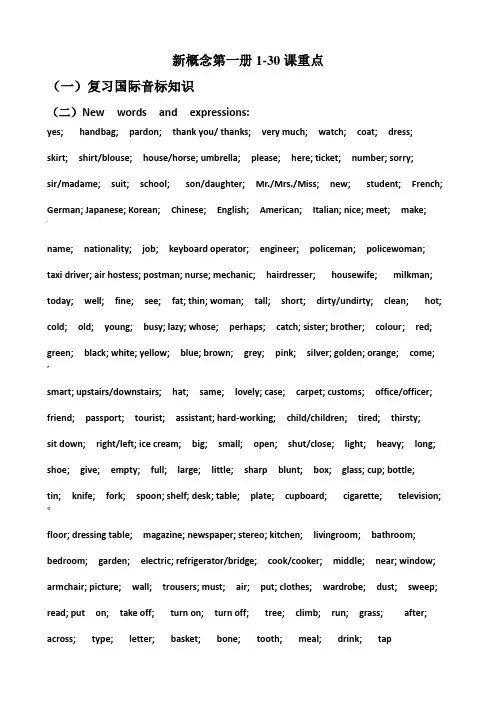
新概念第一册1-30课重点(一)复习国际音标知识(二)New words and expressions:yes; handbag; pardon; thank you/ thanks; very much; watch; coat; dress;skirt; shirt/blouse; house/horse; umbrella; please; here; ticket; number; sorry;sir/madame; suit; school; son/daughter; Mr./Mrs./Miss; new; student; French;German; Japanese; Korean; Chinese; English; American; Italian; nice; meet; make;'name; nationality; job; keyboard operator; engineer; policeman; policewoman; taxi driver; air hostess; postman; nurse; mechanic; hairdresser; housewife; milkman; today; well; fine; see; fat; thin; woman; tall; short; dirty/undirty; clean; hot; cold; old; young; busy; lazy; whose; perhaps; catch; sister; brother; colour; red;green; black; white; yellow; blue; brown; grey; pink; silver; golden; orange; come; ,smart; upstairs/downstairs; hat; same; lovely; case; carpet; customs; office/officer; friend; passport; tourist; assistant; hard-working; child/children; tired; thirsty;sit down; right/left; ice cream; big; small; open; shut/close; light; heavy; long; shoe; give; empty; full; large; little; sharp blunt; box; glass; cup; bottle;tin; knife; fork; spoon; shelf; desk; table; plate; cupboard; cigarette; television; @floor; dressing table; magazine; newspaper; stereo; kitchen; livingroom; bathroom;bedroom; garden; electric; refrigerator/bridge; cook/cooker; middle; near; window;armchair; picture; wall; trousers; must; air; put; clothes; wardrobe; dust; sweep;read; put on; take off; turn on; turn off; tree; climb; run; grass; after;across; type; letter; basket; bone; tooth; meal; drink; tap。
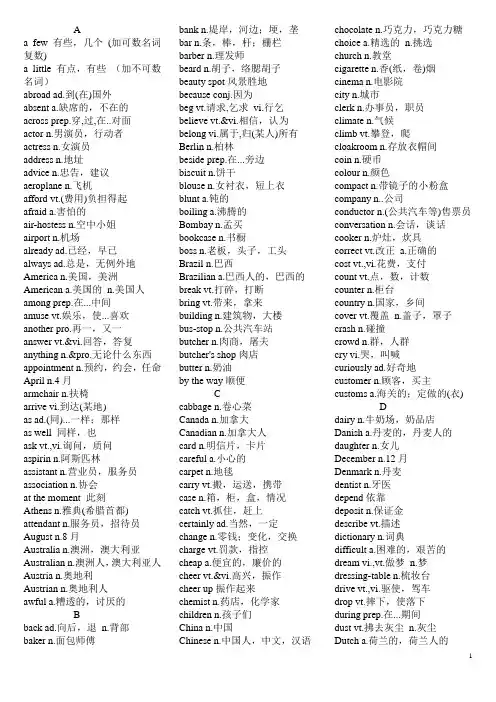
Aa few 有些,几个(加可数名词复数)a little 有点,有些(加不可数名词)abroad ad.到(在)国外absent a.缺席的,不在的across prep.穿,过,在..对面actor n.男演员,行动者actress n.女演员address n.地址advice n.忠告,建议aeroplane n.飞机afford vt.(费用)负担得起afraid a.害怕的air-hostess n.空中小姐airport n.机场already ad.已经,早已always ad.总是,无例外地America n.美国,美洲American a.美国的n.美国人among prep.在...中间amuse vt.娱乐,使...喜欢another pro.再一,又一answer vt.&vi.回答,答复anything n.&pro.无论什么东西appointment n.预约,约会,任命April n.4月armchair n.扶椅arrive vi.到达(某地)as ad.(同)...一样;那样as well 同样,也ask vt.,vi.询问,质问aspirin n.阿斯匹林assistant n.营业员,服务员association n.协会at the moment 此刻Athens n.雅典(希腊首都) attendant n.服务员,招待员August n.8月Australia n.澳洲,澳大利亚Australian n.澳洲人,澳大利亚人Austria n.奥地利Austrian n.奥地利人awful a.糟透的,讨厌的Bback ad.向后,退n.背部baker n.面包师傅bank n.堤岸,河边;埂,垄bar n.条,棒,杆;栅栏barber n.理发师beard n.胡子,络腮胡子beauty spot风景胜地because conj.因为beg vt.请求,乞求vi.行乞believe vt.&vi.相信,认为belong vi.属于,归(某人)所有Berlin n.柏林beside prep.在...旁边biscuit n.饼干blouse n.女衬衣,短上衣blunt a.钝的boiling a.沸腾的Bombay n.孟买bookcase n.书橱boss n.老板,头子,工头Brazil n.巴西Brazilian a.巴西人的,巴西的break vt.打碎,打断bring vt.带来,拿来building n.建筑物,大楼bus-stop n.公共汽车站butcher n.肉商,屠夫butcher's shop肉店butter n.奶油by the way顺便Ccabbage n.卷心菜Canada n.加拿大Canadian n.加拿大人card n.明信片,卡片careful a.小心的carpet n.地毯carry vt.搬,运送,携带case n.箱,柜,盒,情况catch vt.抓住,赶上certainly ad.当然,一定change n.零钱;变化,交换charge vt.罚款,指控cheap a.便宜的,廉价的cheer vt.&vi.高兴,振作cheer up振作起来chemist n.药店,化学家children n.孩子们China n.中国Chinese n.中国人,中文,汉语chocolate n.巧克力,巧克力糖choice a.精选的n.挑选church n.教堂cigarette n.香(纸,卷)烟cinema n.电影院city n.城市clerk n.办事员,职员climate n.气候climb vt.攀登,爬cloakroom n.存放衣帽间coin n.硬币colour n.颜色compact n.带镜子的小粉盒company n..公司conductor n.(公共汽车等)售票员conversation n.会话,谈话cooker n.炉灶,炊具correct vt.改正a.正确的cost vt.,vi.花费,支付count vt.点,数,计数counter n.柜台country n.国家,乡间cover vt.覆盖n.盖子,罩子crash n.碰撞crowd n.群,人群cry vi.哭,叫喊curiously ad.好奇地customer n.顾客,买主customs a.海关的;定做的(衣)Ddairy n.牛奶场,奶品店Danish a.丹麦的,丹麦人的daughter n.女儿December n.12月Denmark n.丹麦dentist n.牙医depend依靠deposit n.保证金describe vt.描述dictionary n.词典difficult a.困难的,艰苦的dream vi.,vt.做梦n.梦dressing-table n.梳妆台drive vt.,vi.驱使,驾车drop vt.摔下,使落下during prep.在...期间dust vt.拂去灰尘n.灰尘Dutch a.荷兰的,荷兰人的Eearache n.耳痛early ad.早a.初期的east n.东,东方a.东方的easy a.容易的Egypt n.埃及either a.二者之一ad.也electric a.电的embarrassed a.窘迫,尴尬employee n.雇员engineer n.工程师England n.英格兰,英国English a.英国的n.英语enjoy vt.享受...之乐趣enjoy oneself过得快乐enough ad.&a.充足,充分enter vt.&vi.进入,加入envelope n.信封everything pro.一切事物examination n.考试,检查except prep.除...之外excite vt.使兴奋,使激动exciting a.令人兴奋的excuse v.原谅;n.原谅,辩解expensive a.昂贵的,耗费巨大的extra a.外加的Ffail vi..vt.失败,不及格fall vi.落下,倒下,跌倒famous a.著名的fare n.车(船)费,旅客票价fashion n.式样,流行式样February n.2月feel vt.触摸,感觉,认为film n.胶卷,电影Finland n.芬兰Finnish n.芬兰语a.芬兰的flu n.流行性感冒for another two days再要两天for sale待售forget vt.遗忘,想不起fork n.叉France n.法国French a.法国人的,法国的fresh a.新鲜的full a.满的future a.将来的,未来的G garage n.汽车修理厂,车库Geneva n.日内瓦gentleman n.绅士,阁下German a.德国人的,德国的Germany n.德国get married结婚glue n.胶水,胶v.用胶粘grass n.草,草地Greece n.希腊(国名)Greek a.希腊人的,希腊的greengrocer n.蔬菜水果商greet vt.&vi.致候,问安grocery n.杂货ground n.地面,土地,底guess vi.,vt.,n.猜测,猜中Hhaircut n.理发hammer n.锤,榔头handle n.提手,柄handwriting n.笔迹,书写,书法happen vi.(偶然)发生hard adv.努力地a.坚硬的have a good time玩得开心headache n.头痛heaven n.天空,天,天堂holiday n.假日,节日;假期Holland n.荷兰honey n.蜂蜜hope vt.希望hostel n.旅店,招待所housewife n.家庭主妇housework n.家务hurriedly ad.匆忙地,急促地hurry up快点husband n.丈夫Iimmediately ad.立刻,马上impossible a.不可能的India n.印度Indian n.印度人a.印度的instead ad.代替,顶替intelligence n.智力,理解力interesting a.有趣的,有意思的introduce vt.介绍invite vt.邀请Italian a.意大利的Italy n.意大利JJanuary n.1月Japan n.日本Japanese n.日本人a.日本的joke n.&vi.开玩笑July n.7月jump vi.跳,惊跳vt.跳过June n.6月Kkettle n.水壶king n.国王,大王knock vt.&vi.敲、击、打Llabel n.标签lamp post n.灯柱large a.大的,巨大的last a.最后的,刚过去的late a.迟,晚;晚期的later ad.后来,较晚lean v.倾斜,探出leave vt.,vi.离开,遗忘left n.左边lettuce n.莴苣licence n.许可,特许,执照limit n.限制,极限list n.名单,清单litter-basket废物筐loaf n.块,片,条London n.伦敦(英国首都)look after照看look for寻找Mmadam n.夫人,太太,女士Madrid n.马德里(西班牙首都)magazine n.杂志make n.(产品)来源vt.制造make the bed铺床make up打扮make up one's mind决定,决心manager n.经理many a.许多的,很多的March n.3月mathematics n.数学matter n.事情,物质,内容mean vt.意指,意谓measles n.麻疹mechanic n.机修工,技工medicine n.药mess n.杂乱,凌乱middle-aged a.中年的mild a.温和的,温暖的mile n.英里millionaire n.百万富翁mince n.绞肉,肉馅mink n.貂皮miss vt.惦念;未赶上mistake n.错误,过失,误会model n.型号,模型moment n.片刻,瞬间Moscow n.莫斯科(俄罗斯首都) move vi.,vt.搬迁,移动much a.很多的,许多的mumps n.腮腺炎must v.aux.必须,应当Nnationality n.国籍nearly ad.几乎,将近need vt.需要neighbour n.邻居neither ad.也不newsagent n.报纸杂志经销社newspaper n.报纸next a.下一(个);与..邻接Nigeria n.尼日利亚Nigerian n.尼日利亚人noise n.闹声,噪音,声响north n.北,北方a.北方的Norway n.挪威Norwegian a.挪威的,挪威人的not...but...不是...而是...note n.纸币,备忘录,记录nothing n.&ad.没有什么东西nuisance n.讨厌的人或事物OOctober n.10月of course当然offer vt.提供,提出office n.办公室,营业所,公司officer n.官员on instalments分期付款opposite a.对面的over prep.在...之上overseas a.海外的,国外的overtake vt.追上Ppack vt.包装,挤满pad n.衬垫,信笺簿pardon n.,vt.原谅passenger n.乘客passport n.护照,通行证,执照pence n.便士(英货币复数)penny n.便士(英国货币单位)perhaps ad.或许,可能,大概photograph n.照片phrase-book n.成语录,短语录piece n.片,块pilot n.飞行员,领航员pity n.令人遗憾的事place vt.放置,排列n.地方plate n.盘platform n.月台pleasant a.愉快的,适意的pleasantly ad.愉快地plenty a.充足的,大量的pocket n.衣袋,钱袋,财力Poland n.波兰policeman n.警察policewoman n.女警察Polish n.波兰语a.波兰的pool n.赌注,合伙份子pound n.磅powder n.粉,粉末,火药present n.礼物price n.价格,价钱,价problem n.问题program n.程序,节目prosecute vt.处罚,对...起诉pure a.纯的Qquarter n.四分之一,一刻钟questions n.询问,疑问,问题quiet a.宁静的Rready a.准备好的,有准备的recognize vt.认出,认识,承认refrigerator n.(电)冰箱regard n.问候,致意;注重regularly ad.经常地,定期地remain vi.保持,继续remember vt.记住,记得,想起repair vt.&vi.修理,修补reporter n.记者rest n.其余者restaurant n.饭店,餐馆retire vt.退休return vt.&vi.回来;归还return ticket来回车票ripe a.熟的,成熟的rise vi.上升,站起roast a.烤过的Rome n.罗马(意大利首都)run after追逐Russia n.俄国,俄罗斯Russian a.俄国的,俄语的rusty a.生锈的Ssale n.卖,拍卖,销路salesman n.售货员,推销员Scotch a.苏格兰的Scotland n.苏格兰(英国)see the world见见世面sell vt.卖,出售,销售sensational a.轰动的serve vt.&vi.侍候(顾客)set vi.降落,下山sharp a.锋利的sharpen vt.使锐利,使尖锐shave vi.刮脸shine vi.照耀,发光sign n.标记,牌子since conj.自...以来,既然size n.大小,尺寸,尺码slip vt.&vi.滑倒;失足smile vi.&n.微笑soap n.肥皂soft a.柔软的,柔滑的sour a.酸的south n.南,南方a.南方的Spain n.西班牙Spanish a.西班牙的,西班牙人speak up大声地说speed n.速度spend vt.度过,花费(钱等)spoon n.匙,调羹square n.广场,正方形stale a.陈腐的stationer n.文具商stationery n.文具steak n.牛排Stockholm n.斯德哥尔摩stomachache n.胃痛stupid a.愚笨的subject n.题目suddenly ad.突然地surprise n.惊奇,意外事surround vt.包围,环绕swallow vt.吞下,咽下Sweden n.瑞典Swedish a.瑞典人的,瑞典的Sydney n.悉尼(澳大利亚港市)Ttake advice接受劝告take off脱掉taxi-driver n.出租汽车司机teacup n.茶杯teapot n.茶壶teaspoonful n.一茶匙的量,一满匙temperature n.温度then ad.然后,其时thief n.贼,窃贼,小偷thirstily ad.口渴地those a. pro.那些tie n.领带tin n.白铁罐tobacco n.烟草,烟叶,烟Tokyo n.东京(日本首都) tongue n.舌,语言tonight n.今晚toothache n.牙痛torch n.火炬,手电筒,火把tourist n.旅游者track n.(运动场的)跑道tramp n.流浪者travel n.旅行vi.旅行truth n.真相,真理,真实性Turkey n.土耳其Turkish n.土耳其语turn off关上(电灯等)turn on打开(电灯等)type vt.&vi.打字typist n.打字员tyre n.轮胎Uumbrella n.伞,伞形uncomfortable a.不舒服的understand vt.,vi.了解,理解untidy a.不整齐的,零乱的upstairs ad.楼上urgent a.紧急的,急切的V valley n.山谷vegetable n.蔬菜village n.村,村庄,乡村visitor n.访问者,参观者voice n.声音,(讲话)声Wwait vi.等待wardrobe n.衣橱warmly ad.热情地wave vi.挥手招呼vt.挥动way n.路,路程,路线weather n.天气,气候;处境west n.西,西方a.西方的wet a.潮湿的,多雨的What a nuisance!真讨厌What's up?干什么?忙什么?whisky n.威士忌酒wood n.树林,木质,木材world n.世界worry vi.,vt.,n.烦恼,担忧worth a.值,相当...之价值XX-ray n.X射线,X光Yyet ad.还,仍,更young a.年轻的youth n.少年,少小时代Zzip n.拉。
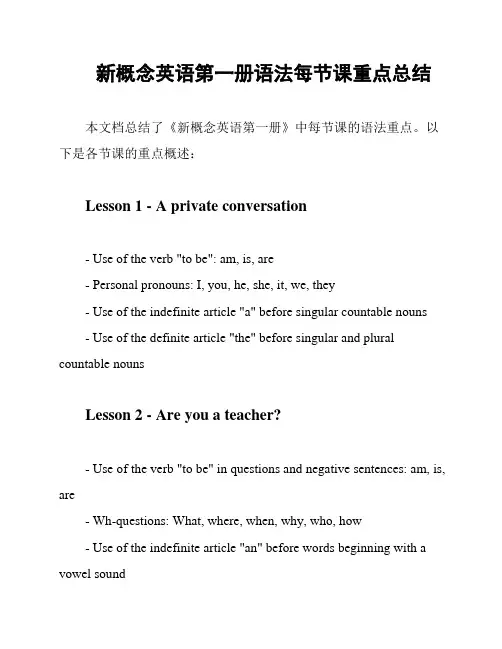
新概念英语第一册语法每节课重点总结本文档总结了《新概念英语第一册》中每节课的语法重点。
以下是各节课的重点概述:Lesson 1 - A private conversation- Use of the verb "to be": am, is, are- Personal pronouns: I, you, he, she, it, we, they- Use of the indefinite article "a" before singular countable nouns- Use of the definite article "the" before singular and plural countable nounsLesson 2 - Are you a teacher?- Use of the verb "to be" in questions and negative sentences: am, is, are- Wh-questions: What, where, when, why, who, how- Use of the indefinite article "an" before words beginning with a vowel soundLesson 3 - The first lesson- Use of the present simple tense: positive and negative sentences - Use of the frequency adverbs: always, usually, often, sometimes, never- Use of the preposition "at" to talk about specific timesLesson 4 - Please send me a card- Use of the imperative form: positive and negative sentences- Use of the infinitive form to give instructions: "to + base verb"- Use of the expression "please" to make polite requestsLesson 5 - An exciting trip- Use of the present continuous tense: positive and negative sentences- Use of the verb "to go" in present continuous tense: am/is/are + going- Use of the prepositions "to" and "at" to talk about destinations以上是《新概念英语第一册》各节课的语法重点总结。
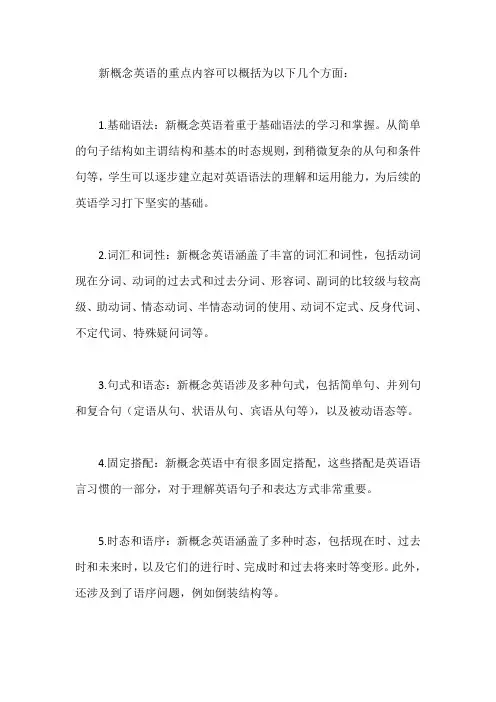
新概念英语的重点内容可以概括为以下几个方面:
1.基础语法:新概念英语着重于基础语法的学习和掌握。
从简单的句子结构如主谓结构和基本的时态规则,到稍微复杂的从句和条件句等,学生可以逐步建立起对英语语法的理解和运用能力,为后续的英语学习打下坚实的基础。
2.词汇和词性:新概念英语涵盖了丰富的词汇和词性,包括动词现在分词、动词的过去式和过去分词、形容词、副词的比较级与较高级、助动词、情态动词、半情态动词的使用、动词不定式、反身代词、不定代词、特殊疑问词等。
3.句式和语态:新概念英语涉及多种句式,包括简单句、并列句和复合句(定语从句、状语从句、宾语从句等),以及被动语态等。
4.固定搭配:新概念英语中有很多固定搭配,这些搭配是英语语言习惯的一部分,对于理解英语句子和表达方式非常重要。
5.时态和语序:新概念英语涵盖了多种时态,包括现在时、过去时和未来时,以及它们的进行时、完成时和过去将来时等变形。
此外,还涉及到了语序问题,例如倒装结构等。
总的来说,新概念英语是一个全面的英语学习教材,旨在帮助学生掌握英语基础知识,提高英语听说读写能力。
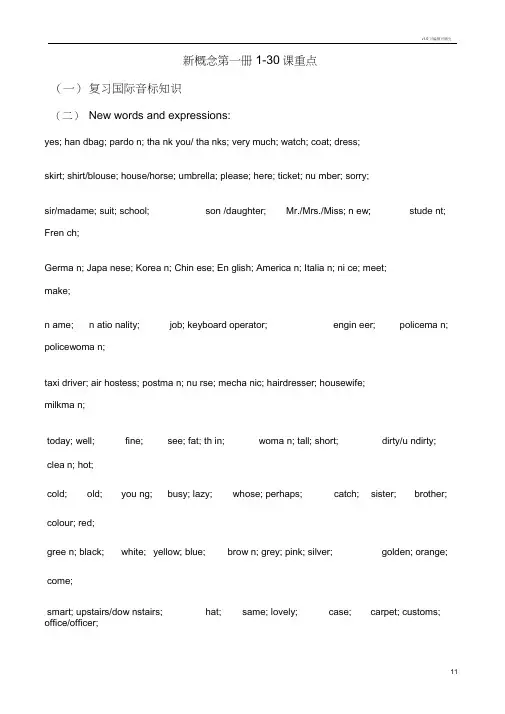
新概念第一册1-30课重点(一)复习国际音标知识(二)New words and expressions:yes; han dbag; pardo n; tha nk you/ tha nks; very much; watch; coat; dress;skirt; shirt/blouse; house/horse; umbrella; please; here; ticket; nu mber; sorry;sir/madame; suit; school; son /daughter; Mr./Mrs./Miss; n ew; stude nt; Fren ch;Germa n; Japa nese; Korea n; Chin ese; En glish; America n; Italia n; ni ce; meet;make;n ame; n atio nality; job; keyboard operator; engin eer; policema n; policewoma n;taxi driver; air hostess; postma n; nu rse; mecha nic; hairdresser; housewife;milkma n;today; well; fine; see; fat; th in; woma n; tall; short; dirty/u ndirty; clea n; hot;cold; old; you ng; busy; lazy; whose; perhaps; catch; sister; brother; colour; red;gree n; black; white; yellow; blue; brow n; grey; pink; silver; golden; orange; come;smart; upstairs/dow nstairs; hat; same; lovely; case; carpet; customs; office/officer;friend; passport; tourist; assista nt; hard-work ing; child/childre n; tired;thirsty;sit down; right/left; ice cream; big; small; open; shut/close; light;heavy; long;shoe; give; empty; full; large; little; sharp blunt; box; glass; cup;bottle;tin; knife; fork; spoon; shelf; desk; table; plate; cupboard; cigarette;televisi on;floor; dress ing table; magaz ine; n ewspaper; stereo; kitche n; liv in groom; bathroom;bedroom; garde n; electric; refrigerator/bridge; cook/cooker; middle; n ear;win dow;armchair; picture; wall; trousers; must; air; put; clothes; wardrobe; dust;sweep;read; put on; take off; tur n on; tur n off; tree; climb; run; grass;after;across; type; letter; basket; bone; tooth; meal; drink; tap(三)、Important sentences:1. Excuse me! 在打扰别人,与陌生人搭话时客套的话。
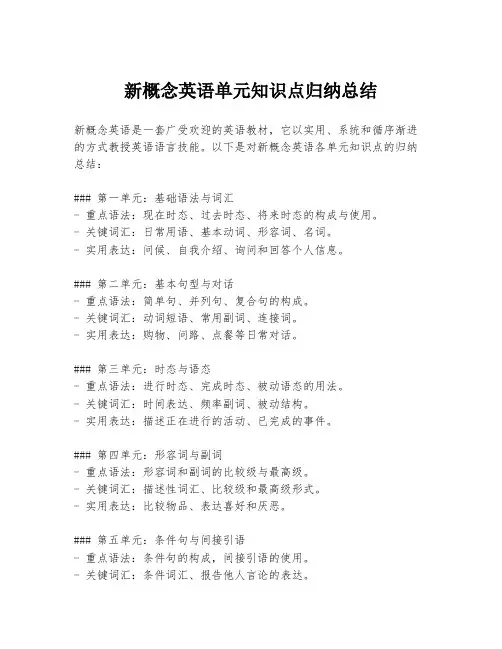
新概念英语单元知识点归纳总结新概念英语是一套广受欢迎的英语教材,它以实用、系统和循序渐进的方式教授英语语言技能。
以下是对新概念英语各单元知识点的归纳总结:### 第一单元:基础语法与词汇- 重点语法:现在时态、过去时态、将来时态的构成与使用。
- 关键词汇:日常用语、基本动词、形容词、名词。
- 实用表达:问候、自我介绍、询问和回答个人信息。
### 第二单元:基本句型与对话- 重点语法:简单句、并列句、复合句的构成。
- 关键词汇:动词短语、常用副词、连接词。
- 实用表达:购物、问路、点餐等日常对话。
### 第三单元:时态与语态- 重点语法:进行时态、完成时态、被动语态的用法。
- 关键词汇:时间表达、频率副词、被动结构。
- 实用表达:描述正在进行的活动、已完成的事件。
### 第四单元:形容词与副词- 重点语法:形容词和副词的比较级与最高级。
- 关键词汇:描述性词汇、比较级和最高级形式。
- 实用表达:比较物品、表达喜好和厌恶。
### 第五单元:条件句与间接引语- 重点语法:条件句的构成,间接引语的使用。
- 关键词汇:条件词汇、报告他人言论的表达。
- 实用表达:表达假设情况、转述他人话语。
### 第六单元:非谓语动词- 重点语法:动名词、不定式、分词的使用。
- 关键词汇:动词的非谓语形式。
- 实用表达:描述习惯、计划和正在进行的动作。
### 第七单元:直接引语与间接引语- 重点语法:直接引语与间接引语的转换。
- 关键词汇:引述他人话语的词汇。
- 实用表达:准确转述对话内容。
### 第八单元:定语从句与状语从句- 重点语法:定语从句和状语从句的构成。
- 关键词汇:关系代词、连接副词。
- 实用表达:详细描述事物、表达时间、地点、原因等。
### 第九单元:虚拟语气- 重点语法:虚拟语气的用法,包括对现在、过去和将来的虚拟。
- 关键词汇:表达愿望、建议、命令的词汇。
- 实用表达:表达假设或非现实情况。
### 第十单元:复杂句型与段落写作- 重点语法:复杂句型的构成,段落的组织。
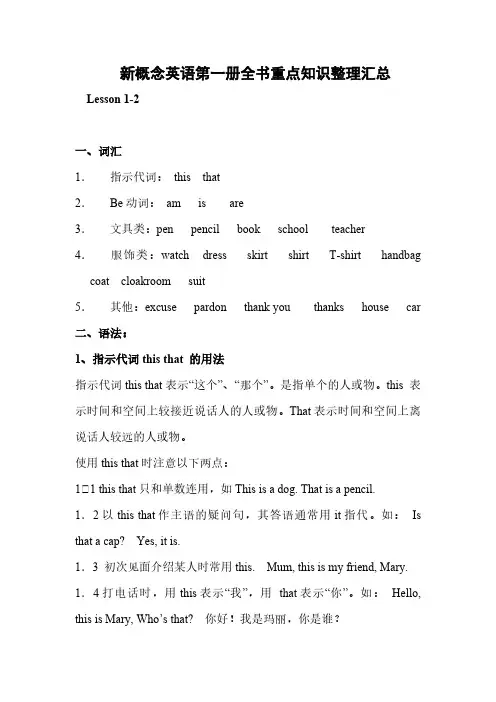
新概念英语第一册全书重点知识整理汇总Lesson 1-2一、词汇1.指示代词:this that2.Be动词:am is are3.文具类:pen pencil book school teacher4.服饰类:watch dress skirt shirt T-shirt handbag coat cloakroom suit5.其他:excuse pardon thank you thanks house car二、语法:1、指示代词this that 的用法指示代词this that表示“这个”、“那个”。
是指单个的人或物。
this 表示时间和空间上较接近说话人的人或物。
That表示时间和空间上离说话人较远的人或物。
使用this that时注意以下两点:1.1 this that只和单数连用,如This is a dog. That is a pencil.1.2以this that作主语的疑问句,其答语通常用it指代。
如:Is that a cap? Yes, it is.1.3 初次见面介绍某人时常用this. Mum, this is my friend, Mary. 1.4打电话时,用this表示“我”,用that表示“你”。
如:Hello, this is Mary, Who’s that? 你好!我是玛丽,你是谁?2、be动词的用法Be动词通常在句中做谓语,基本形式有is/am/are (以下是对应人称代词的固定搭配)I am=I’m You are = You’re He is = He’s She is = She’s It is = It’sWe are = We’re They are = They’re3、陈述句、一般疑问句陈述句:This is your handbag. 陈述句变一般疑问句:Is this your handbag?陈述句变一般疑问句方法四步:3.1 找出陈述句中的助动词,如is am are 3.2 助动词大写提前至句首。
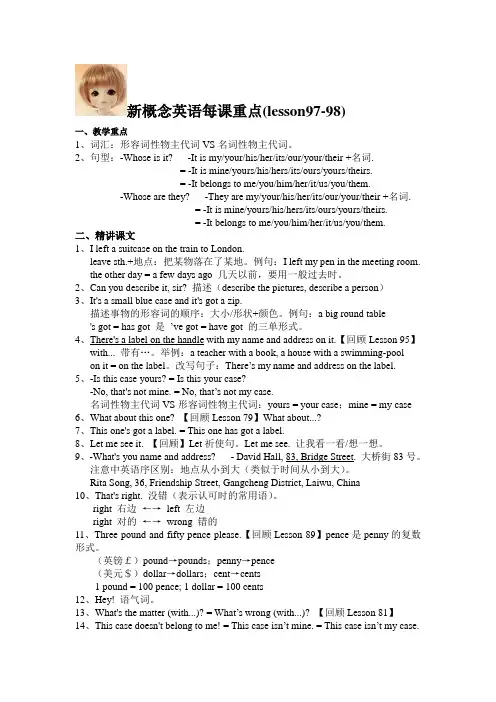
新概念英语每课重点(lesson97-98)一、教学重点1、词汇:形容词性物主代词VS名词性物主代词。
2、句型:-Whose is it? -It is my/your/his/her/its/our/your/their +名词.= -It is mine/yours/his/hers/its/ours/yours/theirs.= -It belongs to me/you/him/her/it/us/you/them.-Whose are they? -They are my/your/his/her/its/our/your/their +名词.= -It is mine/yours/his/hers/its/ours/yours/theirs.= -It belongs to me/you/him/her/it/us/you/them.二、精讲课文1、I left a suitcase on the train to London.leave sth.+地点:把某物落在了某地。
例句:I left my pen in the meeting room.the other day = a few days ago 几天以前,要用一般过去时。
2、Can you describe it, sir? 描述(describe the pictures, describe a person)3、It's a small blue case and it's got a zip.描述事物的形容词的顺序:大小/形状+颜色。
例句:a big round table's got = has got 是’ve got = have got 的三单形式。
4、There's a label on the handle with my name and address on it.【回顾Lesson 95】with... 带有…。
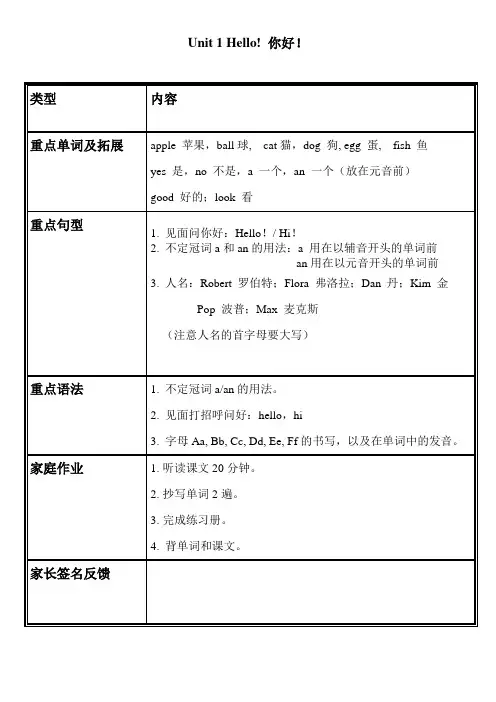
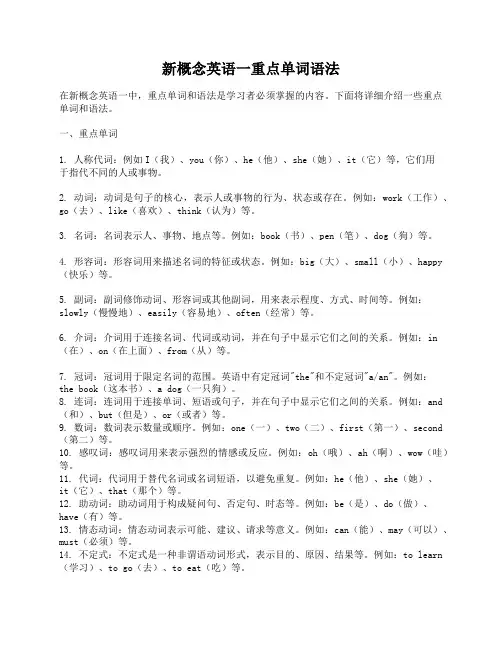
新概念英语一重点单词语法在新概念英语一中,重点单词和语法是学习者必须掌握的内容。
下面将详细介绍一些重点单词和语法。
一、重点单词1. 人称代词:例如I(我)、you(你)、he(他)、she(她)、it(它)等,它们用于指代不同的人或事物。
2. 动词:动词是句子的核心,表示人或事物的行为、状态或存在。
例如:work(工作)、go(去)、like(喜欢)、think(认为)等。
3. 名词:名词表示人、事物、地点等。
例如:book(书)、pen(笔)、dog(狗)等。
4. 形容词:形容词用来描述名词的特征或状态。
例如:big(大)、small(小)、happy (快乐)等。
5. 副词:副词修饰动词、形容词或其他副词,用来表示程度、方式、时间等。
例如:slowly(慢慢地)、easily(容易地)、often(经常)等。
6. 介词:介词用于连接名词、代词或动词,并在句子中显示它们之间的关系。
例如:in (在)、on(在上面)、from(从)等。
7. 冠词:冠词用于限定名词的范围。
英语中有定冠词"the"和不定冠词"a/an"。
例如:the book(这本书)、a dog(一只狗)。
8. 连词:连词用于连接单词、短语或句子,并在句子中显示它们之间的关系。
例如:and (和)、but(但是)、or(或者)等。
9. 数词:数词表示数量或顺序。
例如:one(一)、two(二)、first(第一)、second (第二)等。
10. 感叹词:感叹词用来表示强烈的情感或反应。
例如:oh(哦)、ah(啊)、wow(哇)等。
11. 代词:代词用于替代名词或名词短语,以避免重复。
例如:he(他)、she(她)、it(它)、that(那个)等。
12. 助动词:助动词用于构成疑问句、否定句、时态等。
例如:be(是)、do(做)、have(有)等。
13. 情态动词:情态动词表示可能、建议、请求等意义。
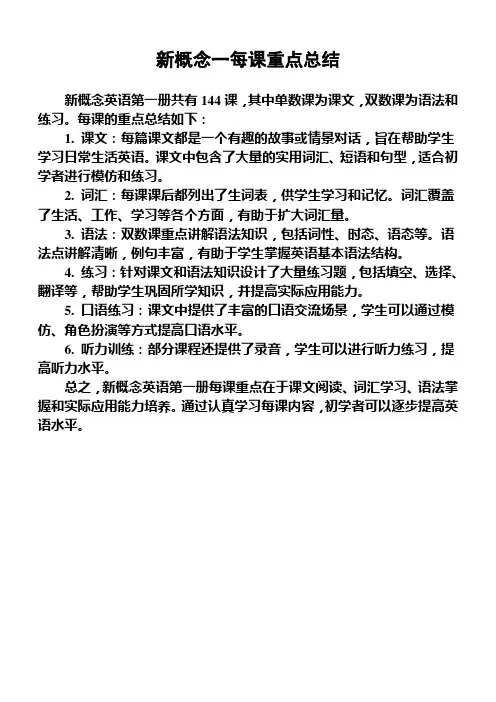
新概念一每课重点总结
新概念英语第一册共有144课,其中单数课为课文,双数课为语法和练习。
每课的重点总结如下:
1. 课文:每篇课文都是一个有趣的故事或情景对话,旨在帮助学生学习日常生活英语。
课文中包含了大量的实用词汇、短语和句型,适合初学者进行模仿和练习。
2. 词汇:每课课后都列出了生词表,供学生学习和记忆。
词汇覆盖了生活、工作、学习等各个方面,有助于扩大词汇量。
3. 语法:双数课重点讲解语法知识,包括词性、时态、语态等。
语法点讲解清晰,例句丰富,有助于学生掌握英语基本语法结构。
4. 练习:针对课文和语法知识设计了大量练习题,包括填空、选择、翻译等,帮助学生巩固所学知识,并提高实际应用能力。
5. 口语练习:课文中提供了丰富的口语交流场景,学生可以通过模仿、角色扮演等方式提高口语水平。
6. 听力训练:部分课程还提供了录音,学生可以进行听力练习,提高听力水平。
总之,新概念英语第一册每课重点在于课文阅读、词汇学习、语法掌握和实际应用能力培养。
通过认真学习每课内容,初学者可以逐步提高英语水平。
新概念英语每课重点(lesson89-90)For sale一、教学重点1、词汇:不规则动词的过去式和过去分词。
2、时态:现在完成时的两种不同用法。
3、句型:-Have you ... yet? -Yes, I have. I did... / No, I haven’t. I’m still doing...What about sb.?二、课文重点1、I believe that this house is for sale. 宾语从句。
(【歌曲】I believe;【薯片】爱比利)= I think that... / I suppose that...【回顾Lesson 75/77/79】I’m afraid that... / I hope that...for sale 供出售,有待出售。
on sale 减价出售。
例句:These books are on sale.2、May I have a look at it? 【回顾Lesson 87】have a look at = look at正式提出请求的方法:May I...? 例如:May I come in?(第一次进某人办公室)较为随意的请求方法:Can I...? 例如:Can I come in?(比较熟悉了之后)3、Yes, of course (you can). 省略回答。
4、Come in.(祈使句)Go out! Get out of here!5、-How long have you lived(=been) here? -I’ve lived(=been) here for twenty years.现在完成时,表示从过去开始的动作或状态一直持续到现在。
(划线部分提问)“for+时间段”是现在完成时的标志性时间状语。
例句:-How long have you studied in that school? -I’ve studied there for two years.6、Twenty years! 感叹句。
新概念英语二册重点单词课文二册一期(L1-20)重点课文:L1 L4 L10 L16 L20重点单词:L1:theatre 剧院,戏院;seat座位;play戏;loudly大声地;angry生气的;attention注意;bear容忍;rudely无礼地,粗鲁地L2:until直到;ring(铃、电话等)响;repeat重复L3:send寄送;museum博物馆;public公共的;friendly友好的;waiter服务员,招待员;lend借给;decision决定L4:exciting令人兴奋的;receive接到收到;different不同的;abroad在国外L5:message信息;service业务服务L6:pocket衣服口袋;call拜访,光顾L7:expect期待,等待L8:competition比赛,竞赛;wooden木头的L9:crowd人群;shout喊叫;refuse拒绝;laugh笑L10:musical音乐的;recently最近;damage损坏;shock使不悦或生气,震惊;allow允许,让L11:immediately立刻L12:luck幸运,运气;proud自豪,important重要的L13:group小组,团体L14:amusing好笑的,有趣的;experience经历;wave招手;replay回答;language语言;journey旅行L15:nervous精神紧张的;afford负担得起;weak弱的L16:park停放汽车;traffic交通;sign指示牌;fail无视,忘记L17:L18L19:pity令人遗憾的事;return退回L20:catch抓到;waste浪费;realize意识到二册二期(L21-40)重点课文:L25 L27 L31 L35 L38重点单词:L21:reason原因L22:dream做梦,梦想;age年龄;throw扔,抛L23:complete完成;strange奇怪的L24:manage经理;complain抱怨;honesty诚实L25:several几个;foreigner外国人;wonder感到奇怪L26:pretend假装;material材料;notice注意到;whether是否;hang悬挂,吊L27:smell闻起来;wonderful极好的;comfortable舒适的,安逸的;heavily大量的L28:trouble麻烦;effect结果,效果L29:lonely偏僻的,人迹罕至的;desert废弃L30:towards朝,向;nearly几乎;sight眼界,视域L31:save积蓄,employ雇佣L32:once曾经,以前;simply仅仅;arrest逮捕L33:darkness黑暗;explain解释,叙述;storm暴风雨;struggle挣扎L34L35:regret后悔;far非常;fright害怕L36: record记录;succeed成功;train训练;intend打算L37: hold召开;capital首都;design设计L38: except出了L39: successful成功的;patient病人;alone独自的L40: hostess女主人;fix凝视二册三期(L41-60)重点课文:L44 L46 L51 L54 L57重点单词:L41:rude无礼的;remind提醒L42:continue继续;difference差别L43:lie处于;serious严重的;seem似乎,好像L44:forest森林;picnic野餐;breath呼吸L45:wallet皮夹;钱夹;villager村民L46:woolen羊毛的;discover发现;admit承认L47:thirsty贪杯的;furniture家具;suggest暗示;accept接受L48:collect搜集L49:tired厌烦的;real真正的;owner主人;sweep扫,刮L50:L51:diet节食;forbid禁止;strict严格的L52:space空间;actually实际上L53:cause引起,原因;examine检查;solve解决L54:mix混合,拌和;annoying恼人的;recognize认出,听出;persuade说服,劝说L55:invent发明;finally最后;confident有信心的;value价值L56:sound声音;speed疾驶L57:punish惩罚L58:increase增加;plant种植L59:expert专家;habit习惯L60:future未来二册四期(L61-80)重点课文:L62 L64 L70 L75 L78重点单词:L61:billion10亿;astronaut宇航员;distant遥远的L62:control控制;surrounding周围的;century世纪L63:admire赞美,钦佩;close亲密的L64:double双的;fear害怕;European欧洲的L65:Christmas圣诞节;present礼物;weigh重;fortunate幸运的L66:survey调查;rescue营救;imagine想象L67:active活动的;manage设法;escape逃脱;alive活着的L68:avoid避开;insist坚持做L69:instruct命令,指示;suppose假设L70:remark评语,言论;safety安全地带L71:official官员,行政人员;check检查L72:racing竞赛;average平均的L73: shame惭愧,羞耻L74: fan狂热者,迷L75: thick厚的;signal信号;helicopter直升飞机;scene现场;survivor幸存者L76: fool傻瓜;leading主要的;present目前的;champion冠军;studio播音室L77: temple庙;disease疾病;last持续;prove显示出L78: concentration集中,专心;suffer受苦,受害;temper脾气;urge力劝,怂恿;satisfaction 满意,满足;delighted欣喜的L79: frightened害怕,担惊;curious急于了解的,好奇的L80:palace宫殿;exhibition展览;various各种各样的;display展览;college学院二册五期(L81-96)重点课文:L81 L85 L89 L93重点单词:L81:rapidly迅速地;uniform制服;shoulder肩L82:sailor海员;creature动物,生物L83:defeat打败;opponent反对者,对手;progressive进步的L84:agreement协议;pressure压力,麻烦;volunteer自动提出,自愿;gratitude感激;object 不赞成,反对L85:inform告诉,通知;contribute捐助,援助;patience耐心;encouragement鼓励;honour 敬意;total总数;devote致力于L86:dismay沮丧;gently缓慢地,轻轻地L87:employer雇主;confirm确认,证实;truth真相L88:surface地面,表面L89:comedy喜剧;queue排队;dull枯燥的,无味的;advertiser报幕员L90:terrifying吓,使恐怖;variety品种;factor因素L91:balloon气球;spy侦察L92:tone语调,腔调L93:statue雕像;support支持,支撑;transport运送L94:L95:heaven天堂L96:festival 节日。
新概念英语第二册重点语法句型新概念英语第二册是初学者学习英语的重要教材,其中的语法和句型是非常重要的。
以下是重点语法句型及其解析。
1. 动词的不定式英语中的不定式是以to开头的动词形式,常常用来表示目的、意图、结果等。
例如:- I want to learn English.(我想学英语。
)- He went to the store to buy some food.(他去商店买了一些食物。
)- She studies hard to pass the exam.(她努力学习以通过考试。
)2. 现在完成时现在完成时是表示过去发生过的动作与当前的关联。
通常是用have/has+过去分词构成,例如:- I have eaten breakfast.(我吃了早餐。
)- They have been to London many times.(他们去过很多次伦敦。
)- Have you ever tried sushi?(你试过寿司吗?)3. 过去完成时过去完成时是表示过去动作在另一个过去时间点之前完成。
常常是用had+过去分词构成。
例如:- They had finished their homework before I arrived.(我到达之前他们已经完成了作业。
)- The movie had already started when we got there.(当我们到达那里时,电影已经开始了。
)4. 被动语态被动语态是指动作的承受者比较重要,而动作的执行者不那么重要。
被动语态的构成是be+过去分词。
例如:- The cake was made by my grandma.(蛋糕是我奶奶做的。
)- The letter will be sent tomorrow.(信件明天会被寄出。
)- The thief was caught by the police.(小偷被警察抓住了。
)5. 虚拟语气虚拟语气是表示假设的语气,常常用在宾语从句、条件从句和表达愿望的句子中。
新概念英语第二册重点语法句型新概念英语第二册重点语法句型一、重要句型或语法1、时态复习一般过去时,表示过去发生的事情,如:Thedriverofthatcarhitthatpostoverthere.2、双宾动词1)双宾动词是指某些动词后面可以跟两个宾语,表物的为直接宾语,表人的为间接宾语。
2)注意区分双宾动词后间接宾语前用to还是for的区别,一般表示动作对某人而做用to,表示动作为某人而做用for。
如:Hepassedthesalttome./Sheboughtthetieforme.二、课文主要语言点Postcardsalwaysspoilmyholidays.spoil在文中表示“破坏”,也可以表示“宠坏”,如:Heisspoiledbyhisparents.他被父母宠坏了。
Lastsummer,stsummer后面用了逗号,主要是为了突出作者去年暑假所做的事情。
注意Italy的读音。
Ivisitedmuseumsandsatinpublicgardens.注意区分garden和park。
文中之所以用public来修饰garden,主要是因为garden一般是指私家房子前后院的花园,而park一般是指供居民休闲的公共绿地。
AfriendlywaitertaughtmeafewwordsofItalian.friendly为形容词,其构词方式:名词+ly。
注意:“副词+ly”构成副词。
teach为双宾动词,所以其短语可改为:taughtafewwordsofItaliantome。
注意Italian的读音。
Thenhelentmeabook.lend是双宾动词,一般用作:lendsb.sth.,也可以用作:lendsth.tosb.。
所以,原句也可改为:Thehelentabooktome.注意:lend表示借出,borrow表示借入(borrowsth.fromsb.。
Ireadafewlines,butIdidnotunderstandaword.line表示“(文字材料的)行”,也可表示“台词”。
新概念英语每课重点(lesson103-104)The French test一、教学重点1、时态:一般过去时VS现在完成时。
2、词汇:could,couldn’t;too,very,enough3、句型:I could... / I couldn’t...二、讲解课文1、How was the exam? = How did the exam go? 考试已完,所以用过去时。
2、Not too bad. / Just so so. / Pretty good.3、I think I passed in English and Mathematics. 宾语从句pass 及格VS 不及格fail;在某一科目中要用介词in,但如果后面加的是某一种考试则不需要介词。
例如:pass/fail the English test/exam/paper4、How about you? = What about you? 用于询问情况(联系上下文)。
或者用于提建议:How about going to France for our next holiday?5、The English and Maths papers weren't easy enough for me.paper 纸张(不可数)a piece of paperpaper 试卷(可数)the English and Maths papersenough 足够地,副词,修饰形容词,用在形容词之后:easy enoughenough 足够的,形容词,修饰名词,用在名词之前:enough books/moneyfor 对…来说。
例如:The house is big enough for us. She’s old enough to go to school.6、I hope I haven't failed. I think I failed the French Test. 宾语从句。
新概念英语每课重点(lesson87-88)A car crash一、教学重点1、词汇:不规则动词的过去式和过去分词。
2、时态:一般过去时VS现在完成时VS现在进行时。
3、句型:-Have you ... yet? -Yes, I have. I did... / No, I haven’t. I’m still doing...二、课文重点1、Is my car ready yet? 【回顾Lesson 81】Is dinner ready, Carol?yet一般是完成时的标志词(否定句或疑问句中),但有时也可用于现在时,表示“已经”。
2、the number of... …的号码。
下文中用it代替。
3、-When did you bring it to us? -I brought it here three days ago.bring sth. to sb. = bring sb. sth. 把某物带给某人(双宾语)这里bring your car to us →bring us your car;这里的here = to you。
反义词:bring带来(由远及近)←→带走take(由近及远)例句:He brought me some flowers. He took some flowers to her.4、I remember now. 一般来说now的现在进行时的标志词,但有时也可用于一般现在时中。
5、Have your mechanics finished yet? 这里yet就是现在完成时的标志词(疑问句中“已经”)。
6、They’re still working on it. 这里still是现在进行时的标志词,表示“仍然,还在”。
work on 表示“从事,做某事”。
it代指的是your car。
例句:-Have you finished your homework yet? -No, I’m still working on it.7、Let’s go into the garage and have a look at it.【回顾Lesson 83】Let’s go into the living room.(Let祈使句)have a look [n.] = look [v.] 看一看;名词look后加东西时,还是要加介词at。
I work in London at a large hospital as a nursing officer. It's what a lot of people call a male nurse, which I think is 1) I've ever come across. It implies that a nurse 2) and that by being male I'm different. The other thing is that people always say "I suppose you really wanted to be a doctor", just because I'm a man. They cannot imagine that I really wanted to be a nurse and that it isn't just that I 3). And what they don't realize is the work's completely different. You know as a male nurse you've 4) with the patients and, you know, a long-term responsibility for their welfare. Huh, there's no way I'd want to be a doctor. Well, 5), of course.Key:1) the most ridiculous term2) ought to be female3) failed to be a doctor4) much more contact5) except for the moneyWhen British people say that their society is based on family life, they are thinking of "family" as 1) in which mother, father and children live together alone in their own house. Thus, every British marriage indicates the beginning of 2)—the great importance of marriage in British life. Marriage means leaving one's parents and 3). The man's first duty will then be to his wife, and the wife's to her husband. He will 4) her financial support, and she for the running of the new home. Their children will be their common responsibility and theirs alone. Neither the wife's parents nor the husband's, nor their brothers or sisters, aunts or uncles, have any right to 5)—they are their own masters.Key:1) an economic and social unit2) a new and independent family3) starting one's own life4) be entirely responsible for5) interfere with themAfter gathering information concerning the company, the applicant is ready for the interview. The interviewer's first impression comes from 1). For most interviews, 2) is a conservative dark colored suit with a long-sleeve white or light blue shirt and a conservative tie. For a woman, a conservative, tailored suit or dress is appropriate. Both men and women should have 3). Although hairstyle and dress are 4), many personnel directors form first impressions from these aspects. For example, one recent college graduate, who felt himself qualified, interviewed for a public relations job. However, the personnel manager considered this young man's long hair, sloppy dress and quite casual manner 5).Key:1) the interviewee's appearance2) appropriate dress for a man3) neat, conservative-length hair4) matters of personal taste5) unsuited for this particular positionLos Angeles is a huge city in southern California. It ranks as the second largest city in the United States, after New York City. The city and its suburbs lie on 1) of the earth's crust. As a result, earthquakes sometimes occur. Most of them caused limited damage. But in 1971, an earthquake centered in San Fernando, just north of Los Angeles, caused 58 deaths and $511 million in 2). In 1987, an earthquake centered in Whittier, east of the city, caused 8 deaths and 3) in damage. In January 1994, a strong earthquake struck Los Angeles. It centered within the city limits—in the Northridge area of the San Fernando Valley section. It was 4) inthe city's history. It caused 57 deaths. Damage estimates ranged above $20 billion. Sections of major freeways collapsed during the earthquake, and 5) for several months.Key:1) an unstable part2) property damage3) $358 million4) the most powerful earthquake5) were closed downThere are different kinds of dictionaries.1) are one-volume, general-purpose dictionaries. They vary in size and, therefore, in scope, but they are the most useful tools for the user. From your desk dictionary you can get information about meaning, spelling, 2).Library dictionaries are also general-purpose dictionaries, yet they supply the information that cannot be found in the smaller desk dictionaries. It 3) in your public library and some college libraries.Specialist dictionaries provide the information that neither desk dictionaries nor even library dictionaries 4). Every trade, profession, and business now has an 5) of its own. The specialist dictionaries meet most of our needs in the specialized areas. Key:1) Desk dictionaries2) pronunciation and grammar3) should be available4) attempt to give5) extensive vocabularyThere are different kinds of dictionaries.1) are one-volume, general-purpose dictionaries. They vary in size and, therefore, in scope, but they are the most useful tools forthe user. From your desk dictionary you can get information about meaning, spelling, 2).Library dictionaries are also general-purpose dictionaries, yet they supply the information that cannot be found in the smaller desk dictionaries. It 3) in your public library and some college libraries.Specialist dictionaries provide the information that neither desk dictionaries nor even library dictionaries 4). Every trade, profession, and business now has an 5) of its own. The specialist dictionaries meet most of our needs in the specialized areas. Key:1) Desk dictionaries2) pronunciation and grammar3) should be available4) attempt to give5) extensive vocabularyThere are different kinds of dictionaries.1) are one-volume, general-purpose dictionaries. They vary in size and, therefore, in scope, but they are the most useful tools for the user. From your desk dictionary you can get information about meaning, spelling, 2).Library dictionaries are also general-purpose dictionaries, yet they supply the information that cannot be found in the smaller desk dictionaries. It 3) in your public library and some college libraries.Specialist dictionaries provide the information that neither desk dictionaries nor even library dictionaries 4). Every trade, profession, and business now has an 5) of its own. The specialist dictionaries meet most of our needs in the specialized areas. Key:1) Desk dictionaries2) pronunciation and grammar3) should be available4) attempt to give5) extensive vocabularyHave you ever had the feeling that someone to whom you are talking would rather be elsewhere than with you, even though he or she seems to 1)? Picturing the scene, we would probably see: (1) The person's head turns towards you and facial signals such as 2) are evident. (2) The person's body and feet are turning away from you, either towards another person or towards an exit. The direction in which a person points his or her feet is a signal of where he or she would prefer to be going.It is noticeable that often in negotiations, when one person has decided to terminate the negotiation or wants to leave, he will turn his body or swing his feet towards 3). If you see these signals 4), you should do something to get the person involved and interested or else terminate the conversation on your terms, which allows you to 5).Key:1) be enjoying your company2) smiling and nodding3) the nearest exit4) during a face-to-face encounter5) maintain the controlWhether work should result in happiness or unhappiness may perhaps be regarded as a doubtful question. Certainly there is some exceedingly irksome work, and 1) is always very painful. However, if work is not 2), even the dullest work is to most people 3). Most of the work that people have to do is not in itself interesting, but it has certain advantages. It fills a good many hours of the day without the need of deciding what one shall do. Most people, when they 4) to fill their own time according to their own choice, are 5) to think of anything sufficiently pleasant to be worth doing. Andwhatever they decide on, they are troubled by the feeling that something else would have been pleasanter.Key:1) an excess of work2) excessive in amount3) less painful than idleness4) are left free5) at a lossFor most Americans, life without a car is 1). Although cars have led people to better lives, they have also brought new problems. People do realize the serious air pollution problem caused by cars. The polluted air becomes 2) to human health.One way to 3) is to build a car that does not pollute. That's what several large companies have been trying to do. But it is 4). Progress in this field has been very slow.Another way is to replace the car engine with something else. Now inventors are working on steam cars as well as 5). Many carmakers believe that it will take years to develop a useful model that pleases people.Key:1) hard to imagine2) poisonous and dangerous3) get rid of the polluted air4) easier said than done5) electric cars。